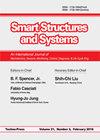Hybrid-ANFIS approaches for compressive strength prediction of cementitious mortar and paste employing magnetic water
IF 2.2
3区 工程技术
Q2 ENGINEERING, CIVIL
引用次数: 2
Abstract
The compressive strength is an important mechanical feature of concrete that is needed in construction design. Thus, a lot of investigations were carried out to predict the compressive strength of various concretes. However, the prediction models for the compressive strength of cement mortar or paste that include magnetic water (MW) and granulated blast-furnace slag (GBFS) are still limited. The current study has developed hybrid algorithms based on adaptive neuro-fuzzy inference system (ANFIS) for modeling the compressive strength of cement mortar and paste that made with MW and GBFS as a novel mixture content. A total of 144 experimental sets of concrete-compressive strength tests for each cement mortar and paste were collected to train and validate the proposed methods, in which the cycles number of water magnetization, cement, GBFS, superplasticizer contents and curing time are set as the input data while the compressive strength value is set as the output. The developed hybrid algorithms of ANFIS optimized by firefly algorithm (FA), Improved Particle Swarm Optimization (IPSO) and biogeographybased optimization (BBO) algorithms for predicting the compressive strength of the mortar and paste. The proposed models and relevance vector machine (RVM) approach were evaluated and compared. The results showed that the ANFIS-FA outperforms other models for modeling the compressive strength of cement mortar and paste. The adjusted-coefficient of determination and root mean square error values of cement mortar models (96.20%, 92.33%, 92.36% and 89.41%) and (2.17 MPa, 3.10 MPa, 3.18 MPa and 3.06 MPa) and of cement paste models (96.92%, 80.91%, 92.19% and 88.18%) and (2.45 MPa, 5.80 MPa, 4.39 MPa and 5.20 MPa) were determined for ANFIS-FA, ANFIS-IPSO, ANFIS-BBO and RVM models, respectively, which indicate that the ANFIS-FA is a suitable model for estimating the compressive strength of cement mortar and paste that include MW. Moreover, the sensitivity of MW and GBFS is shown high for modeling the compressive strength of cement mortar.磁水胶凝砂浆和膏体抗压强度预测的混合anfis方法
抗压强度是混凝土的一项重要力学特性,是建筑设计中所需要的。因此,进行了大量的研究来预测各种混凝土的抗压强度。然而,包括磁性水(MW)和高炉渣颗粒(GBFS)在内的水泥砂浆或膏体抗压强度预测模型仍然有限。目前的研究开发了基于自适应神经模糊推理系统(ANFIS)的混合算法,用于模拟以MW和GBFS作为新混合物含量制成的水泥砂浆和膏体的抗压强度。以水磁化次数、水泥、GBFS、高效减水剂含量和养护时间为输入数据,以抗压强度值为输出数据,共收集了144组不同水泥砂浆和膏体的混凝土抗压强度试验集,对所提方法进行了训练和验证。提出了基于萤火虫算法(FA)、改进粒子群算法(IPSO)和基于生物地理的优化算法(BBO)的混合ANFIS算法,用于砂浆和膏体的抗压强度预测。对所提出的模型和相关向量机方法进行了评价和比较。结果表明,anfiss - fa模型在模拟水泥砂浆和膏体抗压强度方面优于其他模型。分别确定了anfiss - fa、anfiss - ipso、anfiss - bbo和RVM模型的水泥砂浆模型(96.20%、92.33%、92.36%和89.41%)、(2.17 MPa、3.10 MPa、3.18 MPa和3.06 MPa)和水泥浆模型(96.92%、80.91%、92.19%和88.18%)、(2.45 MPa、5.80 MPa、4.39 MPa和5.20 MPa)的调整决定系数和均方根误差值;表明anfiss - fa模型是估算含MW水泥砂浆和膏体抗压强度的合适模型。此外,在模拟水泥砂浆抗压强度方面,MW和GBFS具有较高的敏感性。
本文章由计算机程序翻译,如有差异,请以英文原文为准。
求助全文
约1分钟内获得全文
求助全文
来源期刊

Smart Structures and Systems
工程技术-工程:机械
CiteScore
6.50
自引率
8.60%
发文量
0
审稿时长
9 months
期刊介绍:
An International Journal of Mechatronics, Sensors, Monitoring, Control, Diagnosis, and Management airns at providing a major publication channel for researchers in the general area of smart structures and systems. Typical subjects considered by the journal include:
Sensors/Actuators(Materials/devices/ informatics/networking)
Structural Health Monitoring and Control
Diagnosis/Prognosis
Life Cycle Engineering(planning/design/ maintenance/renewal)
and related areas.
 求助内容:
求助内容: 应助结果提醒方式:
应助结果提醒方式:


